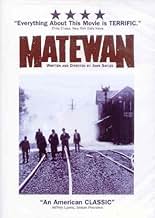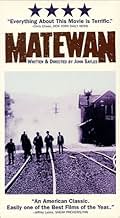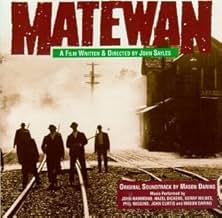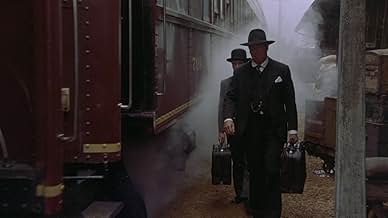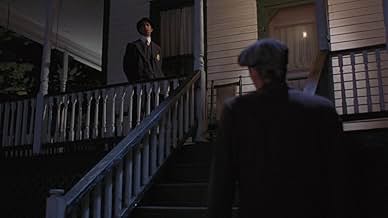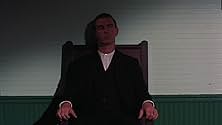Un organizador sindical llega a una asediada comunidad minera dominada y acosada de manera brutal y violenta por la empresa minera.Un organizador sindical llega a una asediada comunidad minera dominada y acosada de manera brutal y violenta por la empresa minera.Un organizador sindical llega a una asediada comunidad minera dominada y acosada de manera brutal y violenta por la empresa minera.
- Dirección
- Guionista
- Elenco
- Nominado a 1 premio Óscar
- 3 premios ganados y 8 nominaciones en total
- Ellix
- (as Michael Preston)
- Dirección
- Guionista
- Todo el elenco y el equipo
- Producción, taquilla y más en IMDbPro
Opiniones destacadas
Chris Cooper, as Joe Menehan, plays a union organizer intent upon bringing the miners of Matewan out from underneath the heel of the coal mine owners. When intimidation and terror tactics fail to cow the locals, the mine operators and their private security thugs bring in scabs, nominally led by "Few Clothes" Johnson - played by James Earl Jones. When the scabs join the strikers the mine operators resort to all-out warfare against the unionized miners.
David Strathairn, Chris Cooper, James Earl Jones, Mary McDonnell - everyone on the cast delivers a believable, wonderful performance. Everything in this movie makes you feel as if you were really there and depicts this often overlooked event in American history with a stark realism that will leave you thinking about it over and over for a very long time.
Such is the impact of the direction, acting, and writing of this movie that when I saw this movie on video about a week ago, it was still as fresh in my mind as when I saw it last on the big screen on opening day.
10 out of 10. Truly an overlooked classic.
John Sayles is a truly admirable film-maker. For three decades now he has been making intelligent and eminently watchable movies, turning down Hollywood's money in order to preserve his artistic independence. He often takes a small acting role in his films - and acquits himself more than competently. In "Leanna" he played the predatory college lecturer, and here he is the 'hardshell' baptist preacher. He gives quite a performance.
West Virginia's misty greenness and steep, wooded slopes are evoked beautifully. The shabby rail depot where the shoot-out takes place is a genuine West Virginian location. The feel for both period and place is created with loving sensitivity. Director of Photography Haskell Wexler has done a great job (look out for the terrific train shot). There is a persuasive grittiness and realism about all of the images, and especially the climactic gun battle, that is utterly absorbing. The music which accompanies the action contains authentic vernacular songs, in perfect keeping with what is in essence a true story.
In the first years of the twentieth century, mine workers in West Virginia lived in abject poverty. Subjected to the 'truck' system, they were paid, not in cash, but in company credits. They had no choice but to spend their wages at the company store, where the mine owners dictated the prices. On top of this, each worker was obliged to buy his own tools and to pay for wash-house facilities.
Into the community of Matewan comes a saintly stranger, Joe Kenehan (played by Chris Cooper). Kenehan is a deserter from Levenworth, a conscientious objector who has taken to the creed of socialism with almost religious fervour. Sent by the union as an emissary, Kenehan's task is to win the confidence of the people and to educate them in the ways of organised labour.
If Kenehan is a symbol of enlightened socialism, 'Few Clothes' Johnson (James Earl Jones) represents the true working-class hero. Few Clothes understands mining more deeply than his bosses ever will. Though he is now in his 50's, his fine body remains immensely strong. This good and gentle man does not like violence, but he will fight to protect his people against their natural enemies - the agents of the mine owners.
Sayles' first-class screenplay cleverly exploits the religious imagery which suffuses the language of these simple, God-fearing folk. The film makes the point that the 'getting' of socialism is a form of religious conversion. Kenehan is a wandering missionary, rather like a biblical prophet, preaching the salvation of collective bargaining. He is an alternative to the preachers, bringing Revelation to the miners, "puttin' the spirit into 'em". Little wonder that Bridey Mae Tolliver (Nancy Mette), the would-be seductress, is seen by the locals in terms of the Old Testament story of Joseph and Potiphar.
The tale is narrated by Davey, the boy preacher whose sheer humanity draws him into the workers' fold. In this wilderness west of the Shenandoah Valley, two broad movements have developed within the baptist faith - hardshell and softshell. The hardshell preachers dispense a strict, unyielding brand of christianity which is unsympathetic to the miners' cause - after all, there is the parable of the toilers in the vineyard. Davey is a softshell preacher, a believer in the brotherhood of man who interprets Christ's message as an exhortation to kindness.
And then there are the Italians. The immigrants speak little English, do not integrate and are (initially, at least) indifferent to the nascent union agitation. They are exploited by the mine owners as unwitting strike breakers. It is through the womenfolk that the antipathy between Americans and Italians is overcome. At first, the women are every bit as hostile towards one another as the men, as shown in the clashes between Rosaria and Mrs. Elkins (Maggie Renzi and Jo Henderson, long-time collaborators with Sayles). However, the great dramas of human life - birth, mourning, and the never-ending struggle to feed their families - draw the women together. The workers realise that far more united them than divides them. "I figure we're all in this together." The Italian miners join the strike.
Hired vigilantes have arrived in town, company men with the express intention of breaking the strike. Their ugly presence sparks trouble, and the escalation of tensions begins, leading to gut-wrenching violence. This tension is superbly conveyed in the scene where the night shift of strike-breakers enters the mine.
At one point, semi-wild hillfolk intervene to drive off Hickey and Griggs, company vigilantes who are terrorising defenceless miners. Sayles' point is that the true Americans know instinctively where right and wrong lie in this conflict. They are the natural allies of the miners.
Sid Hatfield, the law officer of Matewan (played by David Strathairn), is a good man in the great tradition of lawmen. He sees his vocation in simple, powerful terms - to protect his people. When the final confrontation comes, the choice that he makes is one of the most stirring events in a film charged with emotion.
Anyway, the film is very honest, subtle and exquisite. You don't feel, as you do with many films churned out by Hollywood, that things have been altered and embellished for the sake of making it interesting--it's very natural, and it seems very real. You're confidant that Sayles is giving you the truth here, as best he can, through his visual style, restrained, natural dialogue and engaging historic atmosphere.
It's movies like this that renew my faith in period pieces. Important historical films at their best are able to capture a period and bring the audience as close as possible to experiencing the 'feel' of that time--I guess that kinda goes without saying though.
Historically, the film documents a victory (some say massacre) by the miners over the power brokers and thugs of the early 20th century coal mining industry. Taken in the overall context of the history of Appalachian coal mining, however, what it truly documents is one battle in a war that was eventually lost when the government once again came down on the side of commerce as opposed to human dignity at the battle of Blair Mountain.
Fortunately for us, Mr. Sayles seems all too keenly aware of the tremendously important under-currents of this historical event. Rather than merely documenting the conflict and violence of this historic event, he artfully imbues the story with human elements of betrayal, regret, loss, resolve, and ultimately, sacrifice in the name of what is right and just. He reminds us that righteousness often comes with a price and that the real war is never won or lost but rages on forever, claiming the salvation and damnation of souls in it's wake.
This film is a masterpiece and deserves its due. It represents everything good about film-making and should hold a special place in the hearts of all free Americans aspiring to the ideals expressed in our constitution.
¿Sabías que…?
- TriviaThe miners' union was broken by 1921, after President Warren G. Harding put the entire state of West Virginia under martial law and sent the army to the coalfields to defend the companies against their employees. By then, hundreds of miners had been killed, thousands arrested and jailed. It was not until 1935, under Franklin D. Roosevelt's New Deal, that union organizing was legally protected in the United States.
- ErroresLook for the sheriff to remove a gun from someone's hand (by holding the gun by the barrel) after it's been fired four or five times.
- Citas
Joe Kenehan: You think this man is the enemy? Huh? This is a worker! Any union keeps this man out ain't a union, it's a goddam club! They got you fightin' white against colored, native against foreign, hollow against hollow, when you know there ain't but two sides in this world - them that work and them that don't. You work, they don't. That's all you get to know about the enemy.
Selecciones populares
- How long is Matewan?Con tecnología de Alexa
Detalles
Taquilla
- Presupuesto
- USD 4,000,000 (estimado)
- Total en EE. UU. y Canadá
- USD 1,680,358
- Fin de semana de estreno en EE. UU. y Canadá
- USD 23,850
- 30 ago 1987
- Total a nivel mundial
- USD 1,680,358
Contribuir a esta página



